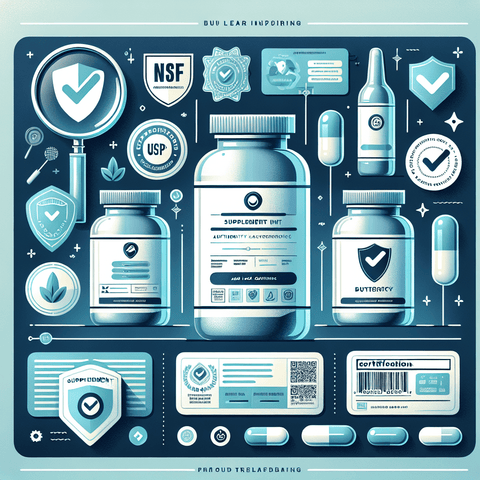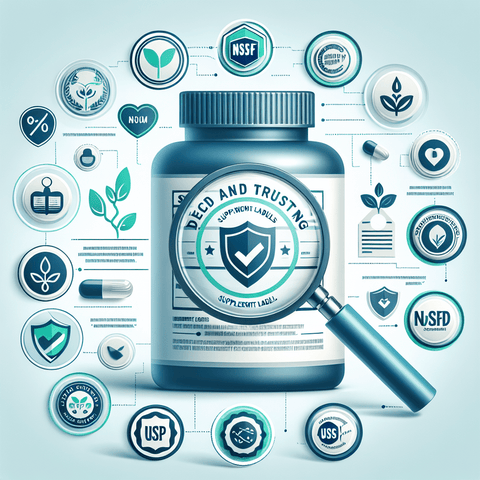Introduction
In today’s health-conscious world, dietary supplements have become a staple for many individuals seeking to enhance their well-being, improve specific health outcomes, or supplement their diet with essential nutrients. The vast marketplace of supplements, however, is fraught with challenges. Not all products are created equal, and many consumers find themselves overwhelmed trying to decipher confusing labels or distinguish genuine products from counterfeit or misleading ones. The consequences of falling for fake supplements can range from inefficacy to serious health risks. This comprehensive guide aims to unravel the complexities of supplement label claims, teach you how to spot authentic products, and empower you with the knowledge needed to make safe and informed choices.
Understanding Supplement Label Claims: What Do They Really Mean?
When browsing supplement shelves or scrolling online stores like Topvitamine, it's common to encounter a myriad of claims. Phrases like "Clinically Proven," "All-Natural," or "Supports Immune System" are designed to attract attention but can also be misleading if not properly understood. To truly grasp what a supplement label is communicating, it's crucial to understand some common language and the regulatory standards governing these claims.
Terms like "Clinically Proven" often imply that scientific studies support a specific benefit, but these claims can be misleading unless the cited research is transparent, peer-reviewed, and directly related to the product as formulated. Be wary if a label mentions "Clinically Proven" without providing a source or further details. The phrase "All-Natural" suggests the absence of synthetic ingredients; however, it is not a regulated term, and it does not guarantee safety or efficacy. Always scrutinize ingredient lists and understand that "natural" does not necessarily mean "safe" or "effective."
Serving sizes are another critical element on labels. Some supplements may modify serving sizes or use confusing terminology to exaggerate benefits or conceal fillers. For example, a label might claim "10x the antioxidant power," but if based on a misleading serving size or an unverified claim, it can mislead consumers. Similarly, claims such as "Supports Heart Health" or "Boosts Brain Function" must be backed by scientific evidence; otherwise, they fall into the realm of marketing hype.
Regulatory standards play a pivotal role in shaping what manufacturers can include on labels. In many countries, agencies like the Food and Drug Administration (FDA) regulate health claims to some extent, but the dietary supplement industry still operates with considerable freedom compared to pharmaceuticals. The Dietary Supplement Health and Education Act (DSHEA) of 1994 in the U.S., for example, allows manufacturers to market products without pre-approval, provided they do not make specific disease claims. This regulatory landscape means consumers need to be vigilant about interpreting label claims, distinguishing between legitimate, substantiated benefits and exaggerated or false statements.
Supplement Authenticity: Recognizing Genuine Products from Counterfeits
Authentic supplements exhibit specific characteristics that set them apart from counterfeit or substandard products. Recognizing these signs is critical in ensuring your health and safety. Genuine supplements typically come in professionally packaged containers with consistent branding, clear labeling, and high-quality printing. Look for proper logos, holograms, batch numbers, and expiration dates that match those listed on the label. Authentic products are often sealed with tamper-evident seals that indicate if the package has been opened or compromised before purchase.
High-reputation brands have a track record of quality control and transparency. Purchasing from reputable sources—such as official brand websites, trusted health food stores, or authorized online retailers—reduces the risk of acquiring counterfeit products. Be cautious when buying from third-party vendors or unverified online marketplaces, as these can sometimes circulate fake supplements designed to mimic real products.
The risks of counterfeit supplements are serious. They may contain dangerous contaminants, incorrect dosages, or harmful substances not listed on the label. In some cases, counterfeit products have been linked to adverse health reactions, including poisoning or allergic responses. Moreover, counterfeit pills or powders might not contain any active ingredients at all, rendering your purchase ineffective and wasting your money. Always verify the legitimacy of the product before making a purchase, especially when dealing with high-demand supplements or discounted deals that seem too good to be true.
Label Deception: Identifying Misleading and False Information
Unscrupulous manufacturers often employ devious tactics on supplement labels to deceive consumers. These include exaggerated benefits, hidden ingredients, vague language, or misleading visuals. For example, a product labeled as “100% Natural” might contain trace synthetic additives or artificial fillers. Bold claims such as “Cures All” or “Guaranteed Results” are red flags that should prompt skepticism.
Vague or ambiguous language, such as "Supports Your Health" without clarification, can be designed to appeal emotionally while lacking scientific backing. Look for specific, measurable claims supported by reputable evidence. Labels that list all ingredients transparently, including inactive fillers, binders, and preservatives, exhibit honesty. Conversely, labels that omit certain ingredients or use code names to hide undisclosed substances are suspect.
Deceptive labels often highlight “special” benefits, like “Rapid Absorption” or “Energy Booster,” without providing context or references. These claims can be exaggerated or unsubstantiated. Always cross-reference such claims with independent scientific sources and review lab-tested evidence where available. Prioritize labels that provide detailed ingredient lists, manufacturing details, and certifications from trusted organizations.
Supplement Fraud Detection: How Consumers Can Protect Themselves
Protecting yourself from fake supplements involves diligent verification. Start by investigating the manufacturer's reputation and reading customer reviews, paying close attention to reports about authenticity issues. Utilize resources like official websites and third-party verification marks. Certification seals from organizations such as NSF International, the United States Pharmacopeia (USP), or ConsumerLab can confirm that the product has undergone rigorous testing for purity, potency, and safety. Be cautious of labels that display multiple certification marks or inconsistent information, which could indicate tampering.
Another practical step is checking batch numbers and expiry dates. Many brands incorporate QR codes or holograms on their packaging, allowing consumers to verify authenticity by scanning with smartphone apps or visiting official websites. These tools often provide detailed product information, manufacturing data, and authenticity verification.
If a supplement appears tampered with—such as torn seals, misspelled labels, or inconsistent packaging—do not purchase or consume. In cases of suspected counterfeit or adulterated products, contact regulatory authorities like the FDA or report to consumer protection agencies. Reporting these issues helps prevent other consumers from falling victim and prompts investigations that may remove dangerous products from circulation.
Supplement Regulation: The Legal Framework and Its Limitations
The regulation of dietary supplements involves a complex framework primarily managed by agencies like the FDA, FTC, and under laws such as the DSHEA. Unlike pharmaceuticals, which require extensive approval processes prior to marketing, supplements are often marketed under a less stringent regulatory umbrella, making oversight more challenging. This creates an environment where the integrity of claims and safety testing can vary significantly among manufacturers.
The FDA's role mainly focuses on post-market surveillance rather than pre-approval. It regulates health claims and ensures labels do not make false or misleading statements, but the manufacturer bears responsibility for safety. The FTC enforces truth-in-advertising laws, monitoring claims related to benefits. However, many claims remain unverified, and enforcement can be slow or inconsistent.
Therefore, regulations influence what manufacturers can claim but do not guarantee efficacy or quality. Loopholes and gaps in enforcement allow unscrupulous actors to exploit consumer trust. For consumers, this underscores the importance of being proactive: researching brands, seeking third-party certification, and verifying claims independently. Increased transparency and stricter regulatory oversight are ongoing needs to better protect consumers and ensure product integrity.
Product Authenticity Verification: Practical Steps to Ensure You Get What You Paid For
Ensuring product authenticity begins with informed purchasing decisions. Always buy directly from manufacturer websites or reputable retail outlets. Check for clear, professional packaging, proper seals, batch numbers, and expiry dates. Many brands now include QR codes or holograms that link to verification pages; take advantage of these tools to confirm authenticity.
Third-party testing and certification marks, such as NSF or USP, serve as valuable indicators of product quality. These organizations perform rigorous testing for purity, potency, and contaminants. When in doubt, use mobile apps or online databases to cross-reference products and verify their legitimacy. These tools can help identify counterfeit items quickly, saving you time and ensuring safety.
Be alert to signs of tampering, such as damaged packaging, broken seals, or inconsistent labeling. Repackaged products or those with missing batch information should be considered suspicious. If you suspect you’ve purchased a counterfeit, contact regulatory authorities like the FDA, and report the incident. Reporting helps protect the broader community and can lead to investigations and removal of unsafe products from circulation.
Conclusion: Empowering Consumers to Make Informed Choices
Informed consumers are empowered consumers. Understanding the intricate language of supplement labels, recognizing authentic products, and being vigilant about deceptive marketing tactics are essential skills for navigating the supplement industry safely. Prioritize transparency, reputable sources, and third-party certifications when selecting health supplements. Always scrutinize labels, question exaggerated claims, and verify product authenticity before consumption. Your health and safety depend on diligent research and caution, especially given the complexities and loopholes within regulatory frameworks. By adopting these practices, you can confidently choose supplements that truly support your health goals and avoid the dangers of counterfeit or substandard products.
Q&A Section
Q: How can I tell if a supplement label claim is scientifically supported?
A: Look for reference to peer-reviewed studies, specific ingredient concentrations, and reputable third-party certifications. Be cautious of vague claims like "Supports Overall Health" without scientific backing.
Q: What are the best ways to verify if a supplement is authentic?
A: Purchase from trusted sources, check for official QR codes or holograms, verify batch numbers with the manufacturer's website, and look for third-party testing seals like NSF or USP.
Q: Are all "All-Natural" supplements safe?
A: Not necessarily. "All-Natural" is not a regulated term and does not guarantee safety or efficacy. Always review ingredient lists and consult healthcare professionals if unsure.
Q: What should I do if I suspect I bought a counterfeit supplement?
A: Stop using the product immediately, retain packaging and purchase evidence, and report the issue to regulatory authorities like the FDA or consumer protection agencies.
Q: How important is third-party certification when choosing a supplement?
A: Very important. Certifications from organizations like NSF, USP, or ConsumerLab indicate the product has undergone independent testing for quality, safety, and label accuracy.
Important Keywords
- Supplement label claims
- Fake supplements
- Supplement authenticity
- Counterfeit supplements
- Third-party testing
- Regulatory standards
- Supplement verification
- Supplements safety
- Label deception
- Authentic nutritional products



